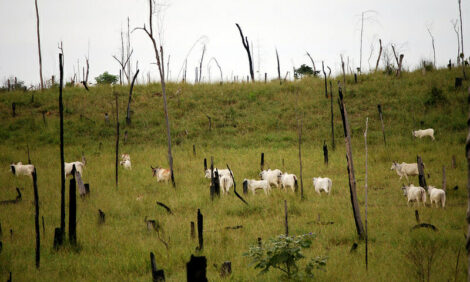



Pirbright, VIDO expand collaboration to advance vaccine manufacturing
Collaboration to tackle diseases in low- and middle-income countriesThe Centre for Veterinary Vaccine Innovation and Manufacturing (CVIM) and The Pirbright Institute signed a memorandum of understanding (MOU) in late October with The University of Saskatchewan’s (USask) Vaccine and Infectious Disease Organization (VIDO). The MOU allows for expanded collaborations and training around vaccine manufacturing to drive innovations for animal health, according to a recent press release.
The collaboration, signed on Thursday 26 October at Pirbright, will contribute to global animal health, including process development and vaccine manufacturing for emerging infectious diseases of livestock, specifically those that affect primarily low- and middle-income countries (LMIC).
CVIM based at Pirbright is supported with funding from the Bill & Melinda Gates Foundation, the Foreign Commonwealth Development Office and the Biotechnology and Biological Sciences Research Council (BBSRC). It was established to help answer an unmet global need to develop vaccines to control disease in livestock and will aid the development and deployment of vaccine technologies to combat neglected and emerging diseases of livestock, including zoonotic diseases that represent a threat to public health.
The overall aim for CVIM is to bridge the gap between basic research and late-stage product development, accelerating the development and production of vaccines with a focus on orphan livestock and zoonotic diseases, including those that affect primarily LMICs, as well as strengthening the UK’s own emergency response capability.
VIDO has almost five decades of expertise developing vaccines against emerging infectious diseases and is one of the largest and most advanced containment level 3-agriculture (CL3-Ag) research facilities in the world. The new Vaccine Development Centre (VDC) at VIDO builds on VIDO’s roots in veterinary medicine and expertise in developing animal models of disease. This is important as most new and emerging human infectious diseases originate in animals.
Both the VDC and CVIM have been established to accelerate commercial development, with a recognized effort to prioritize neglected livestock diseases and urgent emerging zoonotic diseases.
“The growing collaboration between these two institutes is a testament of our partnership to address some of the major global challenges related to food security for the world, particularly for low-and-middle-income countries,” said Professor Bryan Charleston FRS, Director of The Pirbright Institute.
“Collaborating with the CVIM is a vital step towards establishing a global network of key groups with the capacity to drive discovery innovations to commercial readiness,” said VIDO Director and CEO, Dr. Volker Gerdts. “This MOU reinforces VIDO’s commitment to addressing infectious diseases of global importance and foster vaccine commercialisation as Canada’s Centre for Pandemic Research.”
“VIDO’s research efforts address diseases that have the potential to cause profound impact on both humans and animals. These diseases pose a risk to the well-being and welfare of everyone,” said USask President Peter Stoicheff. “Together, the VDC and CVIM are working towards combating this problem and creating solutions that will benefit people around the world.”



